Text
Beautiful Boy
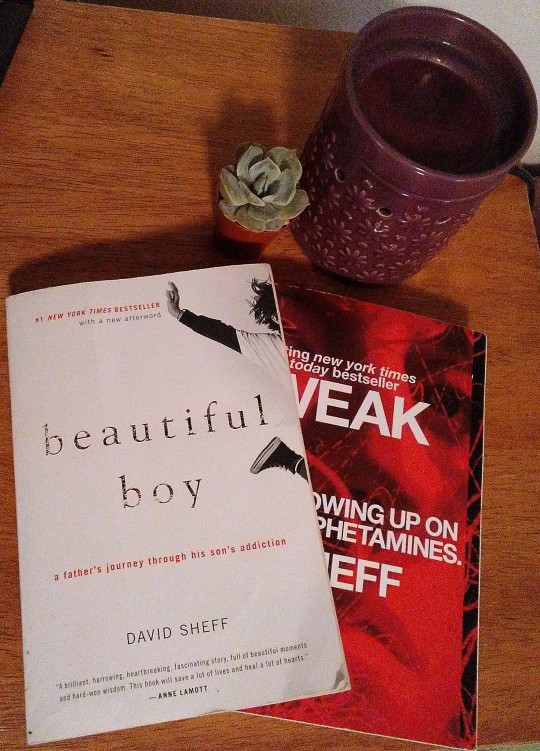
“Beautiful Boy” is a hard, yet necessary read. Simply stated on the cover of the book, the memoir is “a father’s journey through his son’s addiction” and while that may an overarching statement to the series of events described, I would argue that the book is also a story of connection that offers many subtle, poignant definitions of helplessness. Davis Sheff, the father of Nic Sheff and author of “Beautiful Boy” recounts his experience with Nic’s addiction to alcohol and methamphetamine. Although there are many explorations of helplessness throughout this narrative of addiction and recovery, there are three definitions that stand out most. Helplessness is the relentless and debilitating internal monologue of grief. Helplessness is the inability to save. Helplessness is becoming the hostage of an uncontrollable force.
“’You can’t control it.’ But I cannot let Nic go. Not yet. Soon? Not yet. I cannot let Nic go. I will not let Nic go unless I am forced to. I may be. You didn’t cause it, you can’t control it, you can’t cure it. I know” (Sheff 275). It is at this point that David feels there is nothing left to be done, yet he tells himself he must do more. This look into David’s internal monologue shows the incessant grief and hopelessness he feels watching an addiction take his son and having no power to intervene. The short, clipped sentences convey the immobilizing effect of this intense, borderline panic. Even as David weighs his options, either let Nic go or stick it out, he is forced to reason in fragmented and even rehearsed thoughts in order to come to terms with his grief. Not only does this immerse the reader, it creates an emotional connection for those who experienced a similar thought structure. Many people, similar to David, have felt powerless against their own thoughts. David is so skillfully able to communicate his helplessness and relate to that of others by offering this example as a definition.
After another of Nic’s heartbreaking relapses and some of his own medical issues, David’s existential introspection describes another quality of helplessness. He comes to the realization that he cannot save people. “I can try to protect my children, to help and guide them, and I can love them, but I cannot save them” (Sheff 255). Here it is explained that despite any effort made on his part, attempting to save another is futile. The best parts of life are the relationships and connections we make with others; however, these can lead to acute feelings of helplessness such as those experienced by David.
A victim, by definition, is in a pretty helpless position. The emotions surrounding victimization fall under the definitive umbrella of helplessness: confusion, loss, despair, immobility, fear. David recounts a moment when these feelings, and more surround Nic. "'I'm tired. All the fears come in. Confused. What is happening? Why? Why does this keep happening to me?... I feel as if my life has been stolen"' (289). Nic is being taken from and he feels powerless to do anything about it. Addiction, in this case, has taken so much from David, Nic, their families. They've become victim to the consequences of Nic's decision.
Other than the poignant definitions of helplessness offered by this book, there is another theme that gives this story some warmth. That is the idea of connection and its power to save. Throughout both David and Nic's struggle with Nic's addiction, there are many moments where one can see the powerful effects of connection. A number of times in his memoir "Tweak", Nic talks about how his connection to others is what got him through the harder moments. David sums up his experience with AA meetings writing "Elsewhere, everyone asks how I'm doing. Here, they know"(175). Although this sentiment is filled with so much pain, it is clear as his story continues the way connecting with others going through similar experiences bolsters him and gives him strength. Furthermore, the connection he has with Nic is a significant factor in Nic's rehabilitation process. I've pondered connection and its role in protecting and saving others but I've concluded that connection is not a solution to helplessness because it requires something of both sides. You can't connect with someone who won't let you. Connection saves, but it is not something one person can create. How helpless are we, then, to protect one another?
2 notes
·
View notes
Text
L’Evasion
Hey y’all... All 9 of you lol. Today I have an odd essay on a short but true story called L’Evasion by Joseph Kessel. The text follows the escape of a member of the French Resistance (a gaulliste) in a German camp. Super great story! Anyway, I just thought I would give a bit of a preface to this one as it is in French, comme la histoire original;)
La Sacrifice Dans L’Evasion
Tôt dans la Deuzieme Guerre Mondial, Allamagna a pris France. Les personnes Allamand donnaient les personnes Français beaucoup des règles nouvel et la vie des Francais chageaient. Toutes les personnes ont besoin de cartes identité et ils étaient sur le controle des Allamands. Avec la guerre et les Allemands, il y était une personne qui a fait une change. Il s’appellait Charles De Gaulle. Il a formé la resisance et les membres appllaint Gaullites apres Charles De Gaulle. La purpose était donner l’aid a l’autre payes et finir la guerre. La résistance était une organization de sacrifice. Tout les membres et chefs donnaient une sacrifice a une moment ou un autre. Cependant, Il y était certain personnes qui a donné une plus grande sacrifice pour la résistance.
Dans la histore L’Evasion, Il y a deux personnages très important. Un personnage est Roger Legrain, un jeune homme et fils de un communist. grâce à les conditions dans la camp où il habitait, il était malade et faible. Malgré son maladie, il était emballé quand Phillippe Gerbier était arrive. Legrain était un homme loyaux mais il était aussi sensatif. Quand l’ami de Legrain, Armel, est mort, Legrain a pleuré dans le nuit apres il avait dit il était bien. En Chapitre 7 ça dit, “Legrain se forcait a tousser pour étouffe les hoquets de ses sanglots” (Kessel 40). La sensativite de Legrain c’est, un part, pour ça que a la fin il a fait une grande sacrifice pour la résistance. La solution pour son maladie était très cher et Legrain savait que La résistance a eu l’argent pour s’aide. Il a dit à Gerbier, “Je ne veux pas encombrer” (Kessel 62). La résistance était très important pour Legrain et il a sacrifice sa vie pour ça.
Phillipe Gerbier était un nouveau prisonnier au camp des Allamand. Il était très poli et mysterious grâce à ses sourires demi. Au début la histore, Gerbier a eu un but. Il voulait partir le camp. D’abord il utilisait Legrain pour infomation de la centrale électrique et pour une façon pour partir. Mais la histoire a continué et Gerbier et Legrain sont devenu des amis. La personalité de Legrain a changé l’esprit de Gerbier et à la fin de la histoire quand Legrain avait decidé qu’il veut rester au camp, Gerbier était dévasté. Le texte dit “‘Réfléchis une dernière fois’, dit-il, presque suppliant” (Kessle 62). La sacrifice de Gerbier dans cette histoire était partir un bon ami mourir.
À mon opinion, toute la monde a besoin d’un motivation ou un but pour leur vie. Pour Legrain et Gerbier, c’était La Résistance et un espoir pour l’avenir meuilleur. Les sacrifices des ces personnes et toutes les autrès personnes dans La Résistance sont trop importante pour moi d’être pas d’accord avec leur décisions.
#l'evasion#joseph kessel#french#essay#french essay#literature#french literature#Phillipe gerbier#legrain and gerbier are totally gay for each other
1 note
·
View note
Text
An Ember In The Ashes
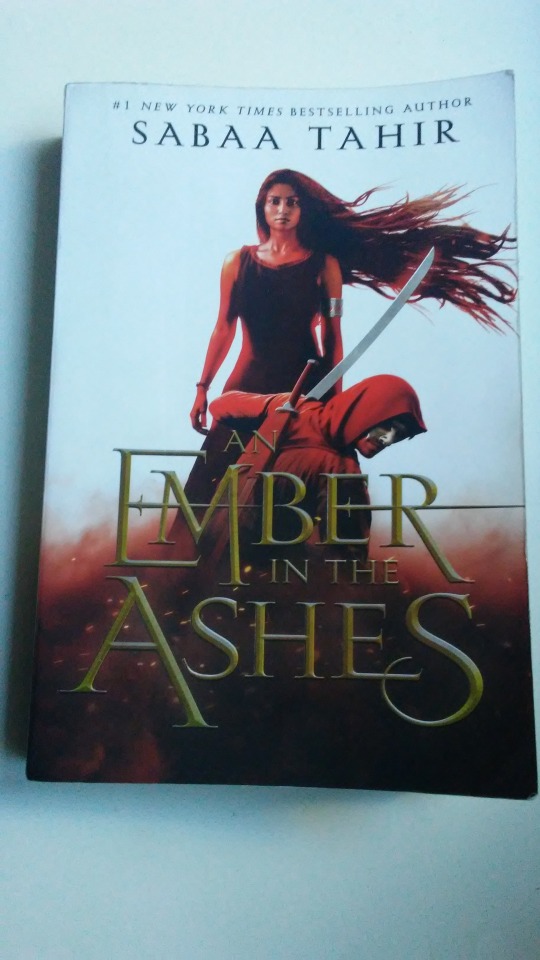
After finishing An Ember in the Ashes by Sabaa Tahir, it was difficult to want more. Despite the enrapturing story, engaging dialogue, and moving themes it was almost too easy to close the book and be done. One reason for this is the tone and feeling of the book. Tahir weaves a fearful undertone into even the happiest of scenes through the use of her eloquent style and harsh diction in order to fully immerse the reader into the worlds of the two main protagonists, Laia and Elias.
The harsh diction Tahir uses, induces fear as it contrasts the smooth flow of story. The contrast is sudden, alerting the reader that something is about to happen. “He pauses suddenly, his hand jerking up to silence me when I ask for the promised explanation. he cocks his head toward the window” (Tahir 5). “He pauses suddenly” immediately gives the reader a warning of events to come while the words “jerking” and “he cocks his head” invite a fearful and precarious atmosphere. In even this small line, the author is able to increase the intensity of the scene, a reoccurring strategy that enhances her style.
The novel continues, the fearful atmosphere is strengthened through harsh diction, and the reader has consistently been on the edge of their seat. A small reprieve is given as the author describes a joyful festival. However, the festival still carries a fearful undertone and the reader is quickly reminded of the reality of the character’s lives. “The mischief in his eyes makes me forget, for a too-brief second, that I am a slave and that my brother is in prison and that everyone else I love is dead” (Tahir 266). Even though Laia forgets about her problems for a moment, this line does the opposite for the reader. It is a harsh contrast to the happy and carefree description of the festival just lines before. As it removes Laia from her reality, it pulls the reader back into the same thus engaging the audience in Laia’s world.
Fear and intensity are the not only emotions that the jarring diction engenders. There is strength and hope as well. The author’s word choice is often catered towards those that create fear and anxiety; however, these jarring and harsh words can also be strong and determined. “You have a soul. It’s damaged, but it’s there. Don’t let them take it from you Elias” (Tahir 373). This quote is a good portrayal of the author’s eloquent style as well as how she uses harshness to create strength. The short sentences make it easier to give certain words emphasis over others. For example, In the last sentence, “Don’t let them take it from you”, the emphasis is on Don’t rather than take. Don’t is the word used to show strength in resistance of fear, while take is the word that shows fear in failure of resisting. By putting emphasis on the strong and hopeful word, the author replaces the fear of the possibilities of losing with the hope of possibilities of succeeding. This is why it was so easy to be done with this book when it ended. There was so much hope for what Laia and Elias’ lives could be. Yet the author had already proven time and time again throughout the novel that the reader, along with the characters, should be fearful of what is to happen next.
3 notes
·
View notes
Text
Imagine Me Gone - Pt. One
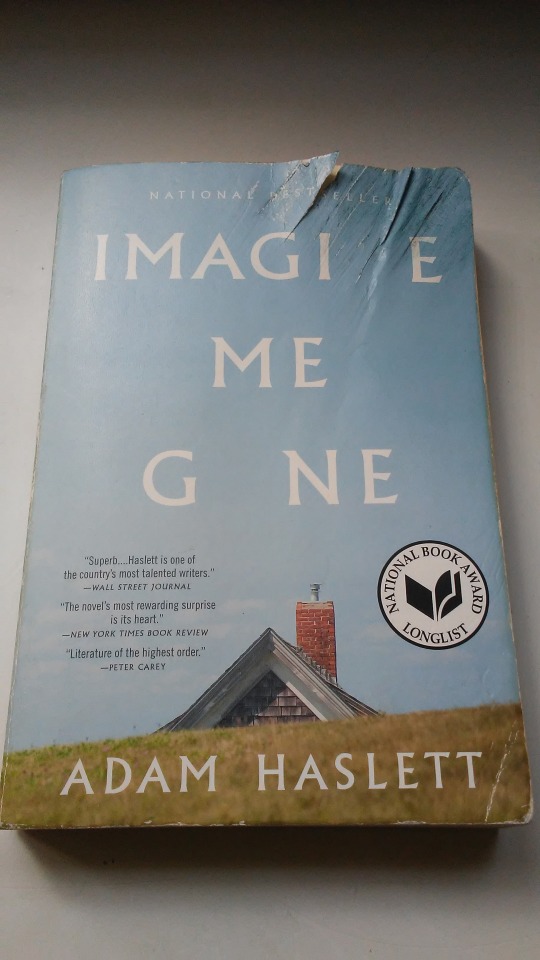
As I’ve started this post, I’ve come to realize that there is too much I want to say about this book and the ideas it encompasses. I’ve thought of writing about mental illness, fundamental’s of individuality, or just the rhetoric of my favorite passages. After much thought and consideration, I still wasn’t able to decide on one idea, especially when more and more kept coming to mind. Eventually I came to the decision to write about the portrayals of love in this book. Again, there is too much I want to write about so I’m going to try to do this in parts... Here is Pt. one: Michael.
Love is a strong enough emotion that it is often compared to a physical feeling. One common description of this feeling is intense This seems to be a prominent theme throughout literature; the intensity of love engenders a slew of consequences. In the novel Imagine Me Gone by Adam Haslett, the concept of love is explored through the various perceptions of a family. One belief of love that each member shares, is that love is painful. Michael feels this most of all. He loves the people in his life fiercely and passionately. He lets his love of others become who is, even until the very end.
Michael is the oldest son of Margaret and John. He understands love as a an all consuming emotion that almost hurts. “I don’t know what most people mean when they use the word love. If they haven’t contorted their lives around a hope sharp enough to bleed them empty, then I think they’re just kidding. A hope that undoes what tiny pride you have, and makes you thankful for the undoing, so long as it promises another hour with the person who is now the world” (Haslett 121). To him, love is hope and the only way to experience it fully is to give it everything one has and to be bled empty by it. He goes on to compare incorrect interpretations of love to people who go to church for the community without any belief in the religion. Of this he states, “I feel sorry for them. They are dead before their time” (Haslett 121). Without love, real love, there is no life. Unless one has let love change their lives, to the point of causing pain, they have not in actuality felt the emotion and have not truly lived.
6 notes
·
View notes
Text
This I Believe II
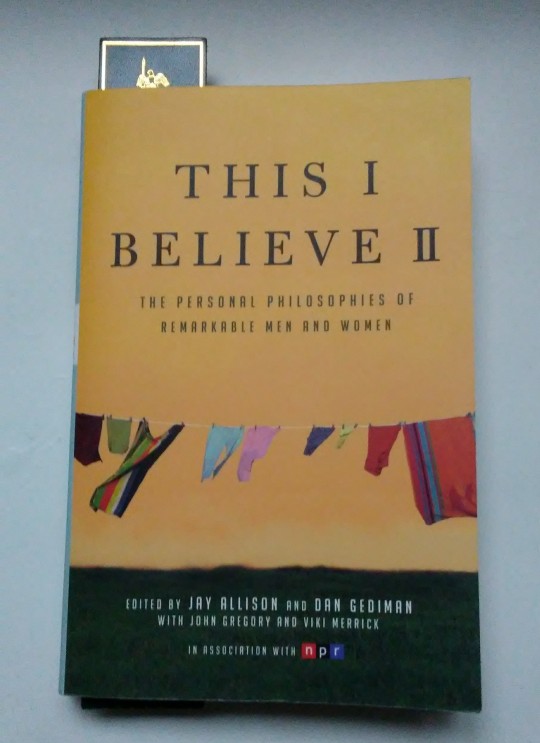
This book was another huge inspiration for my last book post (Something Different) about living your truth.
Basically it’s a series of essays written by really cool people about some of their core beliefs. In a way that’s what my last book post was, something I believe and wanted to share.
Another inspiration for that post was a video made by Daniel Howell called “Trying to Live My Truth”. In my opinion, it was truly inspirational.
#read a book#live your truth#this i believe#dan howell#trying to live my truth#please read this book
4 notes
·
View notes
Text
Something Different
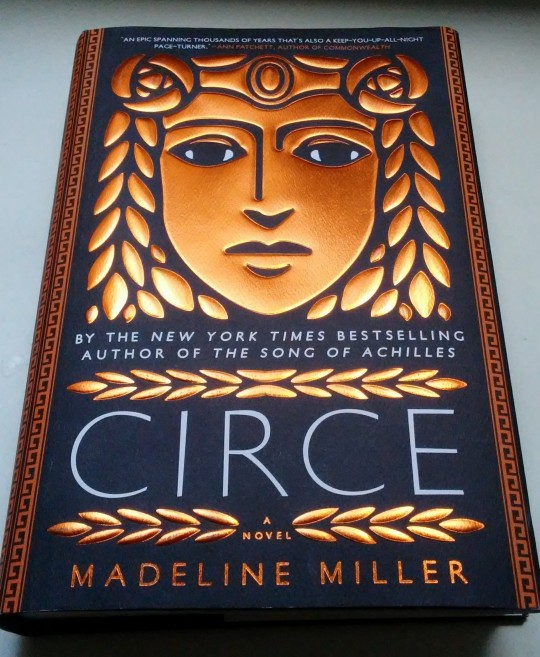
This is an important book.
I believe that books have the power to change a person. One of the many possible ways this happens is by the subtle transfer of ideas.
I write that Circe is an important book because of the impactful themes and ideas Madeline Miller has woven into the telling of Circe’s story. One subtle theme I have only come to realize was there days after finishing the book, is the importance of living your truth. Circe is a novel that tells the story of the witch goddess living in exile on the island of Aiaia. Over the course of this goddess’ eternity, she is exposed to both the wonders and the tragedies of mortality by way of love and death. On multiple occasions Circe falls in love with mortal men only to have them leave her and later hear of their deaths. Despite the heartbreak and trials of immortality, Circe discovers and maintains her truth. This is why I say today’s post is something different. It is more of an exploration of how I believe this anecdote can change a person rather than a discussion of the book itself.
Circe demonstrates living her truth in a way I believe we all can learn from. Being immortal poses the challenge of staying optimistic even when the whole world seems to continue around an individual rather than with them. In other words, Circe is faced with the choice to find positivity and fulfillment in her eternity, or despair in the fact that the world is constantly changing and leaving her behind. Circe struggles with this choice over the course of the novel but eventually finds peace and contentedness living on her island, mastering her witchcraft, loving her son and visitors of the island. She came to realize who she really was once separated from her past life, where she was constantly ostracized for one reason or another, and was able to experience the little pleasures the world has to offer.
Nobody needs to be banished to an island to find their truth. It comes from being awake, attentive, and alive.
“Circe, he says, it will be all right... He does not mean that it does not hurt. He does not mean that we are not frightened. Only that: we are here. This is what it means to swim in the tide, to walk the earth and feel it touch your feet. This is what it means to be alive” (Miller 385).
In summary, to live your truth is to be completely and wholly you. In a way it should feel a bit like being on an island. To live your truth is to feel free to express yourself and to find what makes you happy on your island of life. To live your truth is to not have a care in the world about the outside influences because it’s your island, it’s your life. If we allow ourselves to be defined by outside influences, it is the same as choosing the second option of letting the world move on without us. I just wanted to share these thoughts that ultimately were sparked by this very important book. Find what makes you happy and fulfilled, don’t let the world tell you what to be because eventually you’ll end up being left behind, watching life happen behind the eyes of someone that is not truly you.
#circe#books#live your truth#be happy#read a book#madeline miller#this is all opinion#don't hate me#advice im still working on
5 notes
·
View notes
Photo
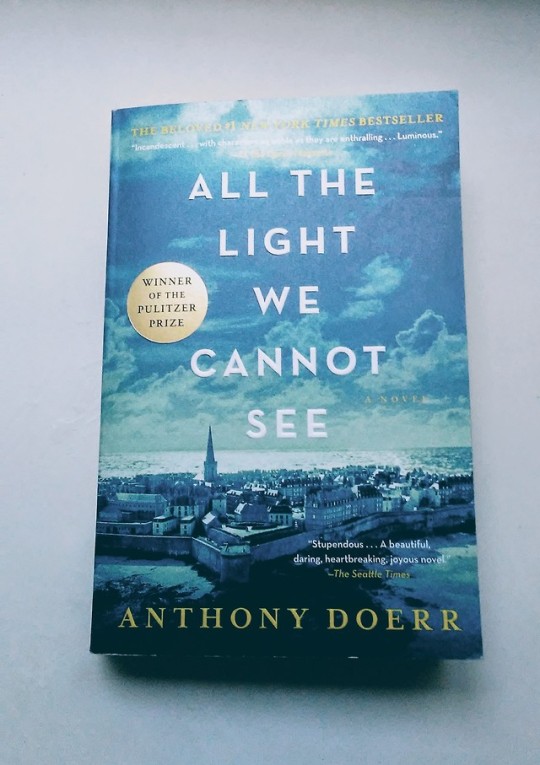
(There shouldn’t be any spoilers but proceed with caution)
All the Light We Cannot See spans the course of 10 years and continuously switches between time periods and character perspectives before, during and after WWII.
Having originally picked up this book for an English report, I was more than pleasantly surprised with how quickly I became attached to it. Even before the characters Marie-Laure and Werner Pfennig became real to me, before the setting of WWII Europe came alive and I was transported to times past, I fell in love with the prose. From the very beginning the author employs metaphors, similes, and personification that suck you into the scene and whimsically paint the picture behind his words.
The author wrote in such a way that the sentences create an aesthetic of sorts. I would relate it to a filter one might place on a picture to create a desired look. Amazingly enough the “filter” the author writes with remains constant throughout the book; From the uneventful yet engaging sections of Marie-Laure’s life, to the riveting and climactic chapters in which the “corsairs city” of Saint-Malo is mercilessly bombed, the “filter” is the same.
This same writing style simultaneously creates an aloof feeling in the reader as they watch the story happen from an excluded perspective, and a deeper connection to the characters, specifically Marie-Laure and Werner. This book demolishes any “good guys” “bad guys” way of thinking when it comes to these two characters. Being an American myself, I find it difficult to disengage from this way of thinking when it comes to the subject of war. In my biased mind, the Americans- or allies -have always been “the good guys”. One half of this book is told from an orphaned boy who was raised an educated to become a German Nazi yet I found myself sympathizing with him, his friends, his family and his fellow countrymen. And why shouldn’t I? My nationalistic perspective is slow to remind me that soldiers on both sides of this war were human.This being said I was able to recognize that there were atrocities committed without defining the characters by them. This idea is better conveyed in the novel.
One focus of this book is definitely on various perspectives. The author jumps between past and present, German and French, as well as the lesser blind and seeing distinctions. This may be a quality some find annoying but in my opinion it works to the advantage of the novel. The story feels complete and solid. The often occurrence of a perspective change, I believe, was the best way to create those feelings for this specific story.
My habit is often to focus on everything I loved about the books I read, if I have a high opinion of them, and visa versa, but I truly believe that All the Light We Cannot See is defined by the spectacular qualities I’ve addressed (not to mention the fabulous story it tells) that work together to create the masterpiece that it is.
3 notes
·
View notes